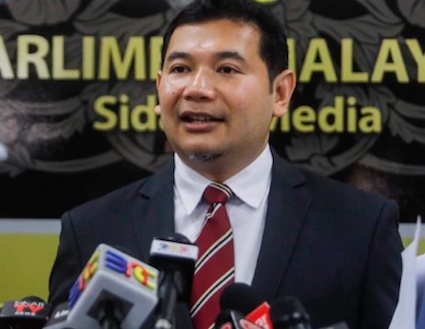Government must be in sync with party policies and wishes, says Rafizi

(MMO) – Challenging the incumbent Datuk Seri Mohamed Azmin Ali for the PKR deputy presidency, Rafizi Ramli said he wanted to create a culture in which PKR government officials uphold the party’s principles in their policies.
Rafizi said there were grouses in PKR about how some government decisions were unilateral, and highlighted questions about whether local councillor appointments in Selangor truly reflected decisions by grassroots leaders.
“We want to make sure that the party ideals actually flow through seamlessly to the Cabinet and to the government because otherwise, you are out of sync,” Rafizi told Malay Mail in an exclusive interview here.
“You can’t be having a representation of the party that is not accountable to the party or does not reflect the decisions of the party,” added Rafizi, who is not an elected lawmaker and holds no government position.
Rafizi said the problems of unilateral decision-making by PKR public officials have been “a recurring theme” through the years, even from Tan Sri Khalid Ibrahim’s time as Selangor mentri besar when PKR first took over the state in 2008. Azmin succeeded Khalid in 2014 and was replaced by Amirudin Shari this year when Azmin was appointed economic affairs minister.
“The emphasis from a significant part of the party has always been that there must be a respect of the accountability of public officials to the party platforms,” said Rafizi.
“What can happen in the case of Khalid last time — the moment you become a state official and power is vested in your hand, you can do as you wish irrespective of the party’s decision on certain issues.”
Without specifying names, Rafizi highlighted complaints about the way PKR chose its candidates to be mentri besar.
“There’re always grumblings that the party had decided on one decision on the mentri besar, and as always, a different decision being presented to a third party,” he said.
“If the decision-making process of the party is respected fully and the accountability to the party is in place, we wouldn’t end up with a decision where the party nominates one person and there is another nomination outside the party structure. It’s not a big issue perhaps to the public, but it’s a big issue internally within Keadilan.”
In 2014, the Selangor palace picked Azmin as MB even though PKR had nominated former president Datuk Seri Dr Wan Azizah Wan Ismail. This year, Ijok assemblyman Dr Idris Ahmad claimed that Pakatan Harapan (PH) had chosen him to replace Azmin as Selangor MB and that Amirudin only had Azmin’s support.
Rafizi said although decision-makers in government were Cabinet members, it was the party that was accountable to the public.
He pointed out that the majority of PKR leaders and some senior DAP leaders were not represented in Cabinet.
“How do you actually build a proper political culture that synchronises properly the accountability of the party?” he said.
“Within PKR for example, the issue to make sure that the minister that represents us holds steadfastly to the ‘Reformasi’ ideals, to the policy platform that translates in all these 20 years of what we asked for, becomes a big issue.”
Some of those ideals, for Rafizi, include parliamentary reforms to ensure the executive does not interfere with Parliament, pointing out that over the past 20 years since the 1998 ‘Reformasi’ movement that sparked the birth of PKR, the government has always “controlled everything”.
“I’m of the view that decisions on the Speaker, the decision on who is the Chief Whip, all that should be left to the MPs to decide and should not be decided by the Cabinet,” said Rafizi.
He framed the PKR election as one of idealism versus pragmatism.
“That comes back to the issue of whether you want to hold true to ideals or whether you want to be pragmatic about it because if we want to become pragmatists, then we can tolerate all this,” said Rafizi.
“As long as someone gets to power, it’s winner-takes-all. Whatever you can do, you should explore everything so long as what matters is the end result. Once you get there, you can ignore what the party feels.”

